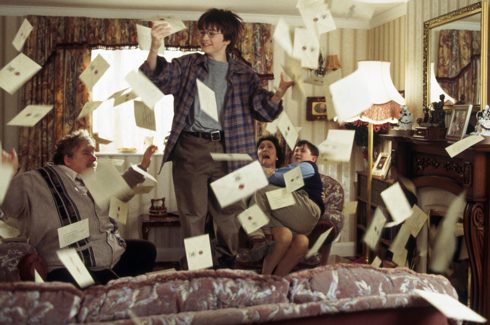I’m going to be re-viewing (and reviewing) the Harry Potter movies. Two necessary prefaces, before we go any further:
- I’ve read each Harry Potter book multiple times and like them all very, very much.
- I’ve seen each movie adaptation, but only once each.
In each case, with 2), I saw the movie either opening weekend in the theater or shortly thereafter, and in each case thoroughly enjoyed myself and didn’t obsess overmuch on detail, changes in adaptation, or any wonky cinema theory or any such eggheadedness. In many ways, but for being a bit older, I was the ideal audience for the movies: a huge fan of the books who was approaching the movies as spectacle and entertainment, rather than looking to slice and dice critically and use lots of big words while adjusting my monocle.
But that, as all else must, ends now. Onward to Harry Potter and the Philosopher’s Stone! (Sorcerer’s Stone in the U.S. and India; to avoid confusion I’ll use the U.K. title because it came first.)
The first movie in the series is a very faithful adaptation of its source novel, to the point where the isolated new lines of dialogue—Draco Malfoy saying “arse,” Severus Snape dropping by Harry’s table in the cafeteria to briefly, awkwardly talk trash about an upcoming Quidditch match—stick out very prominently. Pretty much everything else except the opening chapter and a couple of the obstacles in Harry and retinue’s way during the climax are faithfully, dutifully presented onscreen.
What this means for Philosopher’s Stone as a movie is that it tells the engrossing and genuinely enchanting story of orphaned wizard Harry Potter, sent to live with his nearest living relations, who hate the abnormal in general and magic in particular, denying its existence whenever possible. On Harry’s 11th birthday, a giant named Hagrid arrives, informs him of his true identity and that his parents were murdered by the evil wizard Voldemort, who vanished, presumed dead, when his killing curse inexplicably rebounded on him when he attempted to murder Harry as well. Harry is enrolled in Hogwarts School of Witchcraft and Wizardry, where he makes two lifelong friends in the above-mentioned Ron and Hermione, and stumbles upon a plot to steal a legendary stone that grants immortality… could it be Voldemort trying to steal it? And does Voldemort have an agent among the Hogwarts faculty?
The story is, by this point, legend, but unfortunately the screen version unfolds in a structurally unwieldy fashion. It’s tempting to assume that narrative is narrative and that what works beautifully in a book will ipso facto work in a cinematic adaptation, but a book and a movie are two different things. The fact that Harry doesn’t meet Ron—his best friend for the remainder of the series—until 35 minutes in, by itself, makes the first half of the picture drag a bit. They don’t even rescue Hermione from the troll, completing the friend triad, until over an hour in, and the mystery of the titular stone isn’t even really introduced until after that. Again, this worked fine in the book. The sweep of J.K. Rowling’s occasionally-maligned but undeniably bewitching prose drove the plot with the forward momentum of the Hogwarts Express locomotive.
The fault of the movie’s occasional pacing stumbles, despite having a script that essentially is the book, is director Chris Columbus’. The overlength is entirely the fault of the weird, non-rhythmic way the picture is edited—and seemingly every single shot in the whole movie is a medium close-up that gives no sense of the characters’ spatial relationship to each other—and also a peculiarly insecure need to dwell for a second or two too long on every special effects shot. Still, these details don’t necessarily jump to the foreground unless one is actively looking for them. As a recitation, no matter how poorly shot and edited, of the novel’s plot, Philosopher’s Stone works perfectly well, and the production design is quite handsome, if shoved in the audience’s face a bit much by the “hey, look at THIS” cinematography.
One element of Philosopher’s Stone that holds up quite well is the acting. Of course, people like Richard Harris, Maggie Smith, Alan Rickman (oh, Alan Rickman), Richard Griffiths, and Fiona Shaw (and all the luminaries who’d join the series in subsequent installments) are going to be great. But the kids—Daniel Radcliffe (Harry), Rupert Grint (Ron), and Emma Watson (Hermione)—all give excellent performances, much better than I’d remembered. Grint is given a few too many wisecracks than really necessary, but he handles them well, and performs a genuinely moving (though of course non-fatal) act of self-sacrifice in the climax.
As a start to the series, Philosopher’s Stone, despite its cinematic creakiness, delivered the goods as an act of good faith to fans of the novels. It isn’t so much an adaptation of the novel as it is a transcription, which as an opening gesture to the passionately loyal Harry Potter fan base was a wise move. As a movie, Philosopher’s Stone has its downside, but as the start to a franchise it succeeds brilliantly.
Danny Bowes is a playwright, filmmaker and blogger. He is also a contributor to nytheatre.com and Premiere.com.










